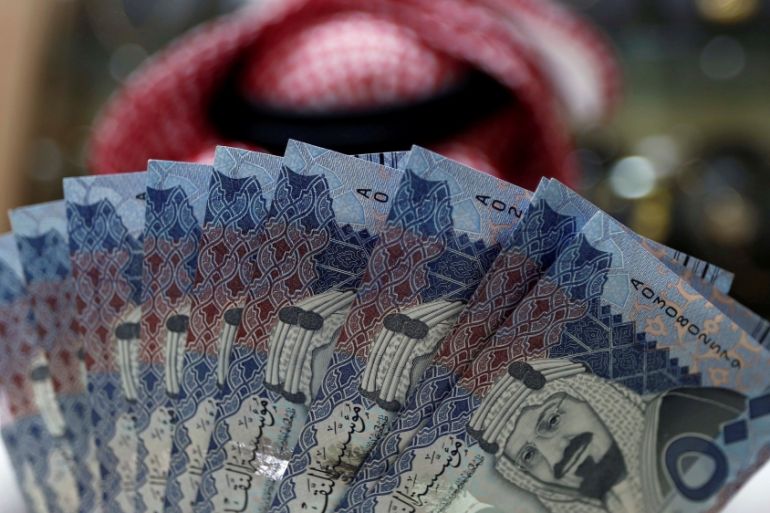Will new tax spur economic reform in UAE, Saudi Arabia?
Five percent value-added tax will be imposed on food, clothes and fuel, while housing and school fees are exempt.

Saudi Arabia and the United Arab Emirates are ringing in the new year with the introduction of a five percent value-added tax (VAT) on most goods and services, in an effort to boost revenue and revive their oil-dependent economies.
The tax, which goes into effect on Monday, will be imposed on a wide range of commodities, including food, clothes, fuel, entertainment, electronics, and telephone, water and electricity bills.
Keep reading
list of 4 itemsQatar emir condemns ‘genocide’ in Gaza, urges ceasefire at GCC summit
‘Enduring commitment’: Key takeaways from US-GCC joint statement
Analysis: Efforts to end Assad isolation gather speed after quake
Rent, real estate sales, airline tickets and school fees are excluded from the scheme.
The move is part of a region-wide measure agreed upon by the six Gulf Cooperation Council (GCC) member states in Riyadh in 2016.
“The imposition of VAT will help to raise tax revenues of the Saudi government to be utilised for infrastructure and developmental works,” Mohammed Al-Khunaizi, a member of Saudi’s Shoura Council, said on Sunday.
The other GCC members – Qatar, Bahrain, Oman and Kuwait – have until January 1, 2019, to impose the tax.
Diversifying the economy
Tim Callen, the International Monetary Fund (IMF) Mission Chief for Saudi Arabia, told Al Jazeera that the introduction of the VAT is “an important step in the right direction” and “likely to be positive for investors in the longer term”.
“Government revenues in the GCC are very reliant on the proceeds from the sale of oil,” he said. “This makes them vulnerable to swings in the oil price. It is important that the GCC countries diversify their sources of government revenue to reduce this reliance.”
According to IMF estimates, the planned VAT rate in the Gulf nations will raise additional revenues of some 1.5 to 3 percent of non-oil gross domestic product, depending on the country.
Both Saudi Arabia and the UAE – like other Gulf nations – have suffered since oil prices crashed four years ago.
In June last year, on the recommendation of the IMF, Saudi Arabia and the UAE officially applied a 100 percent selective commodity tax on tobacco and energy drinks and 50 percent on soft drinks.
”I
defeats the whole purpose of people coming into Dubai and investing their time, life, money and career.”]
In addition, since last July, Saudi Arabia has levied fees on expatriates’ dependents of all nationalities. Corporate income taxes are also imposed in some Gulf nations.
However, experts say the implementation of the new value-added tax will not offer a “big boost” to the two oil-dependent nations.
“It is unlikely to impact the economies or the GDP. Both Saudi Arabia and the UAE have outward-looking economies that are not based on domestic consumerism,” Ellen Wald, author of the upcoming book Saudi, Inc. and a non-resident scholar at the Arabia Foundation, told Al Jazeera.
Jane Kinninmont, a senior research fellow at the Chatham House think-tank in London, said the effect on the overall economy would be mixed.
“VAT transfers money from consumers to the government, so it will help boost the government’s non-tax income, but may also dampen private consumption,” she said.
Saudi Vision 2030 masterplan
In December, Saudi Arabia unveiled its largest state budget – a record 978 billion riyals ($261bn) – for the current fiscal year.
The Kingdom projects it will generate about $209bn in revenue this year but run a deficit until 2023, according to the finance ministry.
Crown Prince Mohammed Bin Salman is spearheading the government’s Vision 2030 masterplan to revitalise and diversify the Kingdom’s oil-dependent economy.

Saudi oil giant Aramco will sell five percent of its shares in what could be the world’s largest initial public offering, expected to raise $100bn this year. The deal is at the heart of Saudi Arabia’s economic reform programme.
Roby Barrett, a Gulf expert at the Middle East Institute in Washington, DC, noted: “My view is that entire societies don’t get transformed in a decade. It takes generations and generations, and so we’ll see what happens by 2030.”
Cost of living
Uniforms, books and bus fees at schools will be taxed under the VAT scheme, as will higher education in the UAE. Fuel prices in the UAE will experience a four to six percent rise compared to last month, according to the Ministry of Energy.
Experts are predicting a 1.5 percent increase in living costs, the Abu-Dhabi-based National newspaper reported.
Meanwhile, Saudi Arabia is set to raise prices for domestic cooking gas and jet fuel by about 80 percent in January 2018, according to a Bloomberg report.
|
|
“On a more long-term scale, as a general rule with VAT, the lower-income residents feel the impact of a VAT more because they spend a larger percentage of their incomes and wealth,” Wald said.
“However, in comparison to most other developed countries, the population will have little to complain about.”
Still, there are concerns among residents over the increase in their household expenditures.
One expatriate and Dubai resident, who spoke to Al Jazeera on condition of anonymity, said the VAT would be “one tough pill to swallow for many”.
“I think it defeats the whole purpose of people coming into Dubai and investing their time, life, money and career, thinking they will save that extra bit of money, considering it was a tax-free city,” he said.
“Initially, it might not rattle the financial equation of my household a great deal, but it will surely creep in on us as they increase it every year.”
Follow Saba Aziz on Twitter: @saba_aziz